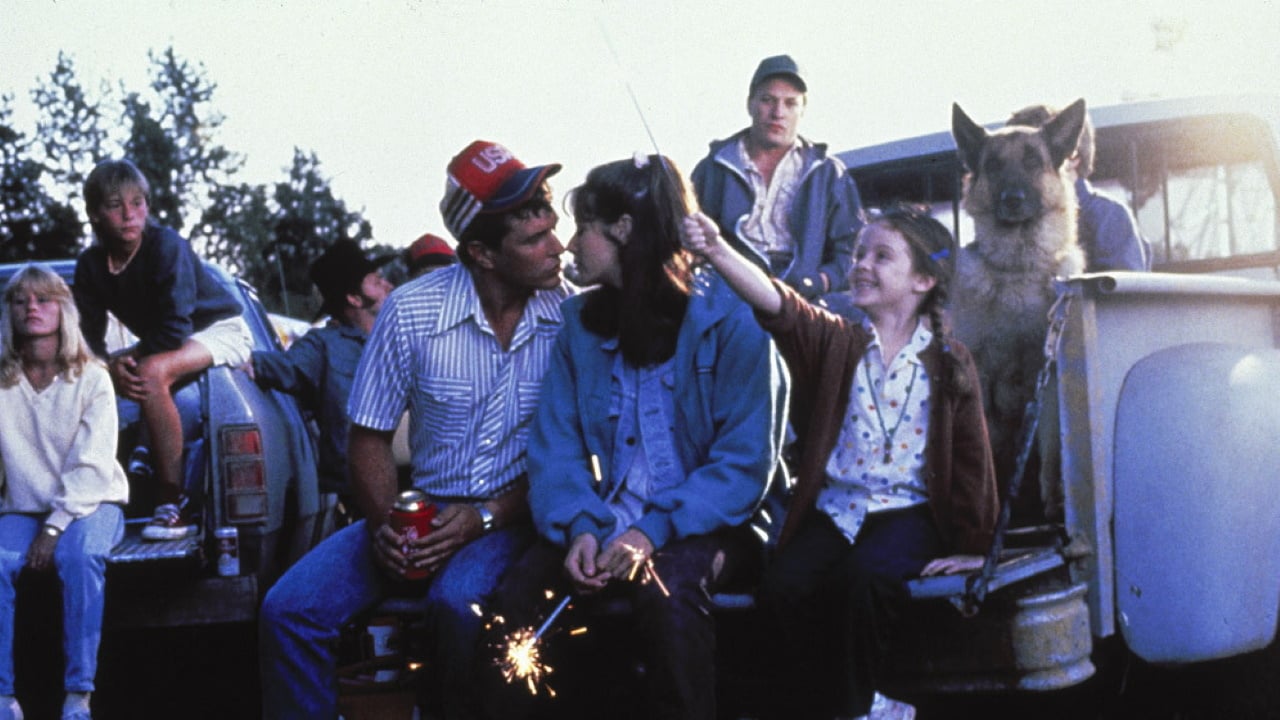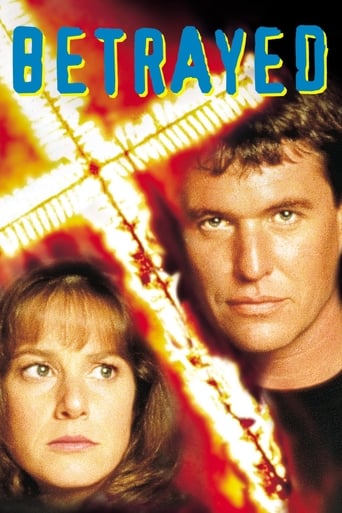Hellen
I like the storyline of this show,it attract me so much
Vashirdfel
Simply A Masterpiece
Borserie
it is finally so absorbing because it plays like a lyrical road odyssey that’s also a detective story.
Abegail Noëlle
While it is a pity that the story wasn't told with more visual finesse, this is trivial compared to our real-world problems. It takes a good movie to put that into perspective.
Sabrina
*Spoilers marked at end* I'm a little puzzled by the low rating here. I gained some light by reading the more negative reviews and it seems that the points of the film may have been missed by some. Those who did get it and still didn't like it I can totally respect, but so many here just aren't getting it.If you have any interest in the film, give it a chance, please. This is seriously underrated, as it is one of the most complex and mature films to come out of the 80s. Winger and Berenger both deserved Oscars, honestly. She is so underrated herself. Winger absolutely inhabits this role. She IS this woman. Her beautiful eyes are so expressive. She can convey everything we need to know just by her face. She carries this film through any faults it has.Berenger is equally fantastic. No wonder this was his favorite role.**SPOILERS AHEAD**After he discovers that she's with the FBI, we see him laying in bed with her, tears falling silently on his pillow. In this moment we find the point of the film. People who do terrible things are still human. They are not monsters. Just people. They can be wicked and disgusting and twisted, but still have love and gentleness in their souls. In the film's last moments, this point is driven home in a bittersweet goodbye with her almost-stepdaughter Rachel. We can see the path Rachel is on, the same as her father. In just a few years she could behave just as wickedly as he did.But there's a glimmer of hope that she will remember Winger's character, remember her words, and choose a different path. And so, how will we ever address these societal issues unless we can realize these are just people? That doesn't mean sympathize or excuse. But knowledge is required for true change.Amazing film.
gretz-569-323863
I was going to rate this movie a 6, but at the last minute gave it an 8 instead, because I saw it for the first time on cable a week ago, and I can't stop thinking about it.there are definitely "plot holes you could drive a truck through," as they say. the biggest one is something other reviewers have noted. Debra Winger's character Katie/Cathy is forced to go back and continue her undercover work (pun intended) several times, even though there's PLENTY of information to convict all of these people on multiple charges many times over. I guess it's good to know the FBI is so scrupulous about the "righteousness of their busts" but seriously...!other people have mentioned the "night hunt" scene. I watch a lot of movies, horror movies especially, but I have to say that this was one of the only times I've ever literally watched a scene with my jaw hanging open. I got the impression that the crimes were supposed to "ramp up" somehow throughout the movie and get more and more serious, but the hunt scene was far more awful than anything that came after.the movie is beautifully filmed. one scene in particular caught my eye: it's early in the courtship of Gary and Katie, and they've just come back into his house through the front door, which is still open. they stand facing each other, the farmland beyond framed by the door, and the trees all blowing in the wind. I finally figured out that it reminded me of that great (and very windy) scene in "The Quiet Man" and borrowed by "ET" with John Wayne and Maureen O'Hara. I do not know if that was deliberate on the part of the filmmaker, but it was really pretty either way.
tieman64
A shock jockey radio host is murdered. The FBI believes a white supremacist group of Midwestern farmers to be responsible. Agent Cathy Weaver, played by actress Debra Winger, is assigned to infiltrate the gang. She does so, and soon finds herself faking a love affair with Tom Berenger, a Vietnam veteran, widower, farmer and leader of one of the white supremacist "terror" cells.The film's premise is interesting and appropriately disturbing, but like most of director Costa Gavras' Hollywood films, can't maintain its highs. On the plus side, the film plays some interesting morality games. Consider this: the film's racists are humanised and we're invited into their private lives and families, whilst the FBI are shown to be as isolated, narrow minded, compartmentalized and goal oriented as the white supremacists. The end result is that Gavras suggests that the country as a whole has arranged itself into hermetically sealed compartments, arranged around class, politics, race, religion and ethnicity, each section claiming absolute and exclusive humanity. In other words, isolation and social alienation create attitudes of inhospitality, racism and hatred. The Cathy Weaver character tries to resolve this by rejecting both the FBI and the white supremacists and by adopting Tom Berenger's children as her own. She essentially represents the healing balm of maternal love, teaching kindness and understanding to the kids of tomorrow.In terms of flaws, the film plays several scenes too heavily for shock value. This is the result of the notoriously crass screenwriter Joe Eszterhas. Many of the film's far right leaning xenophobes are likewise big caricatural lunatics and the film's high concept plot is at times unrealistic.Some of the film's "shocks" nevertheless do work well, Gavras taming Eszterhas' sensationalism with subtle truths. Scenes in which parent's indoctrinate their kids are creepy, the "holiday camp for white supremacists" sequence is haunting and the film's KKK rallies and midnight hunting parties (guess what they're hunting) have visceral effect. There's also something downright unsettling about little kids matter-of-factly saying the N word. The fact that many of the white supremacists are veterans who fought in Vietnam, opens up some interesting avenues, linking state sanctioned, government approved racism with Berenger's group, who call themselves ZOG ("The Zionist Occupation Government"). ZOG fly under no political flag, but their political assassinations and ethnic cleansings have idealistic overtones typical of various dark national "policies". Gavras draws numerous parallels between the FBI and ZOG's underground network of cells and high tech "agents".7.9/10 – Some of the best moments in Gavras' filmography are in this film, but one too heavily senses the soul sucking presence of Hollywood's and Joe Eszterhas' vampiric fangs. Gavras is striving for a kind of nervous intimacy, whilst Eszterhas relies heavily on Hollywood formula, his script taking interesting material in all the wrong directions. Like many directors (Hal Ashby, Coppola, Altman, Hill, etc), Gavras struggled once the 80s hit.Worth one viewing.
classicalsteve
At a crucial moment in the movie, the racist militia group that is the focus of the movie robs a bank, and one of their own are killed by an FBI agent. When asked shortly thereafter how he felt about the killing, the agent says that it was no more than wiping dirt off of his shoe. We often like to think of those people who engage in hatred and violence as being completely "unhuman". We want to believe that they are without emotions, without humanity, without integrity and mostly without love. In short, we want to believe that those with monstrous attitudes are only monsters and nothing else. And it is not so, which is I think the point of "Betrayed". People who adhere to what mainstream society judges as dangerous prejudices are in fact much more complex and often have more of humanity than we would like to believe.The story centers around two characters: Gary Simmons, played with much tact and depth by Tom Berenger, a leader of a local white supremacist militia group, and Catherine Weaver, alias Katie Phillips (played with complete believability and subtleness by Debra Winger), the FBI Agent who infiltrates the group. Her goal: to link Simmons and his group with the slaying of a leftist shock-jock who is slain at the beginning of the film, an incident which closely resembles the real-life assassination of Denver radio talk show host Alan Berg, a leftist personality known for hanging up on callers and other on-the-air rudeness. (In real life he was the most popular and simultaneously the most hated radio host in his geographic area.) The FBI also wants to undercover any future plans the group may be concocting that might involve assassinating celebrities and/or politicians.At first, Phillips believes the FBI have targeted the wrong people since despite their use of the N-word and occasional racist jokes, they appear to be peaceful friendly and neighborly, they appear to respect women, and they often give a helping hand to those in need. Gary Simmons is a loyal father, a model citizen who speaks his mind, a hard-worker, and a straight-shooter. He always tries to do the right thing. He is low key and doesn't speak often about his political views. And Phillips also finds herself quite taken with his two beautiful children who are innocent while simultaneously being indoctrinated with prejudice that may manifest itself later as hate and violence. To add to the confusion, Phillips finds herself falling for Simmons, wanting to believe that he is the wrong man.But as Phillips sinks deeper into the family and friends of those around Simmons, she learns she is very wrong. After Simmons takes her "hunting", a deadly game in which a captured African-American is then hunted by a group of whites like a British Fox Hunt with automatic weapons, she realizes there is more to this group than her initial observations would indicate. Then a camping trip reveals that it is true, that Simmons and his close associates are members of a complex supremacist group with connections all over the country to people who believe that Jews, African-Americans, Gays, and Lesbians, and almost any other non-white ethnic group are intending to exterminate their livelihoods if not their lives. They have rationalized that they have to fight back. And these groups are their targets for not only hatred but for proposed violent engagements.Phillips' other world is her FBI associates that keep pushing her to stay the course and complete her mission by staying within the family. Unlike her mid-west "family", the FBI team are emotionless, less sympathetic to the traumatic toll the assignment is taking on Phillips, and rather cold about what they are really doing. The government agents have little understanding that despite racists' destructive attitudes, they are real people who love, who grieve, and want happiness. While the FBI wants to put the racists into a convenient stereotypical box, Phillips realizes there is much more to these people than their hate. But she does find that their flawed perception of reality lies within a complex myriad of rationalizations that serve to construct their world-view. They have convinced themselves that only their hate and violence can save them.The movie becomes a struggle between these two worlds, and at one point, Phillips begins to question which side is the "good" side, and ultimately she must make a choice between the two. The irony is that if we want to "fight" prejudice we can't "fight" the people, as it only fuels the next generation of racists and proves their point. Maybe we can't even fight the attitudes. Maybe we need to love them despite their attitudes and maybe that would foster more love as it appears that hate only breeds more hate regardless of which side we are on.

